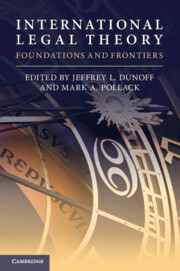Book contents
- International Legal Theory
- Reviews
- International Legal Theory
- Copyright page
- Contents
- Contributors
- Acknowledgments
- Part I Introduction: Setting the Stage
- Part II Traditional Approaches to International Law
- Part III Critical Approaches to International Law
- Part IV Post–Cold War Approaches to International Law
- Part V Interdisciplinary Approaches to International Law
- 12 Rationalist and Behavioralist Approaches to International Law
- 13 The Sociological Perspective on International Law
- 14 The Practice of Interpretation in International Law: Strategies of Critique
- Part VI International Law: Dialogue and Dialectic
- Index
13 - The Sociological Perspective on International Law
from Part V - Interdisciplinary Approaches to International Law
Published online by Cambridge University Press: 21 July 2022
- International Legal Theory
- Reviews
- International Legal Theory
- Copyright page
- Contents
- Contributors
- Acknowledgments
- Part I Introduction: Setting the Stage
- Part II Traditional Approaches to International Law
- Part III Critical Approaches to International Law
- Part IV Post–Cold War Approaches to International Law
- Part V Interdisciplinary Approaches to International Law
- 12 Rationalist and Behavioralist Approaches to International Law
- 13 The Sociological Perspective on International Law
- 14 The Practice of Interpretation in International Law: Strategies of Critique
- Part VI International Law: Dialogue and Dialectic
- Index
Summary
Sociological analysis of international law begins from the premise that international legal rules and institutions are deeply embedded in the particular sociocultural features of certain communities. Sociological factors and processes thus form an inseparable dimension of international law, and international law is both affected by and influences such factors and processes. Sociologists of law have long emphasized that law is rooted in communities, and laws are considered by these scholars as expressive of types of those communities. Since international law emerges from and operates within diverse social groups, Emile Durkheim’s famous statement is significant also for international law scholars: society is more than the individuals who compose it; society has a life of its own that stretches beyond our personal experience. Consequently, the fundamental idea that reverberates in countless sociological studies is that the social whole of a group is greater than the sum of its parts, and knowledge about social relations cannot be derived solely from knowledge about the individuals who comprise the group.
- Type
- Chapter
- Information
- International Legal TheoryFoundations and Frontiers, pp. 282 - 304Publisher: Cambridge University PressPrint publication year: 2022

